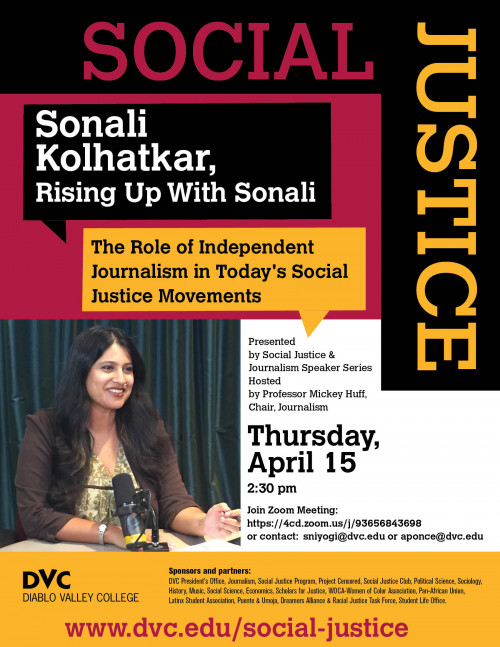“No Requirement to Tell the Truth”: Progressive Radio Host Sonali Kolhatkar Talks About the Flaws of Corporate Media
April 28, 2021
To introduce a recent Social Justice Speaker Series event, Mickey Huff, chair of the journalism department and professor of social science and history, opened with a quote by Malcolm X: “If you aren’t careful, the newspapers will have you hating the people who are being oppressed and loving the people who are doing the oppressing.”
The line set the tone. As students would hear over the next hour, the flaws of corporate media are the reason why independent news outlets remain so important.
In the April 15 event, titled “The Role of Independent Journalism in Today’s Social Justice Movements,“ guest Sonali Kolhatkar – host and producer of the nationally syndicated radio show “Rising Up With Sonali” – Host and Producer, Sonali Kolhatkar, explained that as a young journalist in Los Angeles, she covered corruption and incidents of police brutality within the Los Angeles Police Department. Early on, she said, she discovered the ways that the corporate media repeatedly failed to respond to systemic problems.
“The corporate media dismissed the concerns about racist policing (and) they dismissed the claims that police discriminate against black people,” Kolhatkar said.
The main problem with corporate outlets, she said, is that they strive for profit rather than delivering good and accurate news. “The for-profit corporate model is broken. It’s actually by design broken, because The New York Times, CNN, these are for-profit corporations.” And ultimately, she said, “if profits drive you, there’s no requirement, to tell the truth – there’s only the requirement to make a profit while sticking to some semblance of the truth, and if the truth can be massaged to make better profits, then so be it.”
Kolhatkar added that because corporate media get their profits from advertising, large news companies strive for “clicks” rather than providing solid and accurate news.
The corporate media echo-chamber is another destructive force that often prevents people from accessing fair, neutral information, she added.
“Right wing media influences mainstream liberal-leaning corporate media much more than we think,” she added. “If Fox News Sunday starts referring to social security and medicare as entitlement programs, pretty soon that language is adopted by The New York Times and CNN as just a given, and then politicians from both parties use it.”
Kolhatkar urged students to question what isn’t being said or explained in mainstream news reports. “When you consume corporate media, think about what they’re not telling you, think about what the deeper angle to the story is, seek out independent media sources,” she said, and “try to learn the difference between a reliable news source and an unreliable news source.”
Young people today are “a little bit more savvy now because [they have] grown up with social media, more so than those who are my age or older,” she added. “It’s so important that we understand the deliberate blind spots of the corporate media.”
So what kind of media does she recommend, and how does she go about finding the information she needs? Kolhatkar said she begins her day by reading the Times, the Washington Post and articles published by the Associated Press, which give her a lay of the land. “I start with what I think is the most biased media to the least biased, then I read Reuters, then I work my way to The Guardian and sometimes I read Huffington Post as well as Al Jazeera,” she said.
In her work as a progressive journalist, Kolhatkar said the trick isn’t to deny the power or influence that corporate news has on our lives, but to find ways to see beyond it.
She concluded, “There are some really great independent media sources that you can sprinkle into corporate media sources and you’ll suddenly see the contrast between them.”






































































